EVENTS
The Building Inclusive Cities Symposium was held from October 13 – October 27, 2022 and consisted of five knowledge exchange events. We hosted four arts-based workshops with cross-sectoral groups of planning, heritage and museum professionals. Each workshop began with a facilitated experience of the Block by Block: Stories of Migration, Life, and Change in Four Toronto Neighbourhoods exhibition in the Toronto Reference Library’s TD Gallery, followed by activities and dialogue focused on a discrete theme. The symposium culminated in a panel discussion, titled “How Oral Histories Inform Equity-based Community Planning and Heritage Policies and Practices” at the University of Toronto’s Faculty of Information.
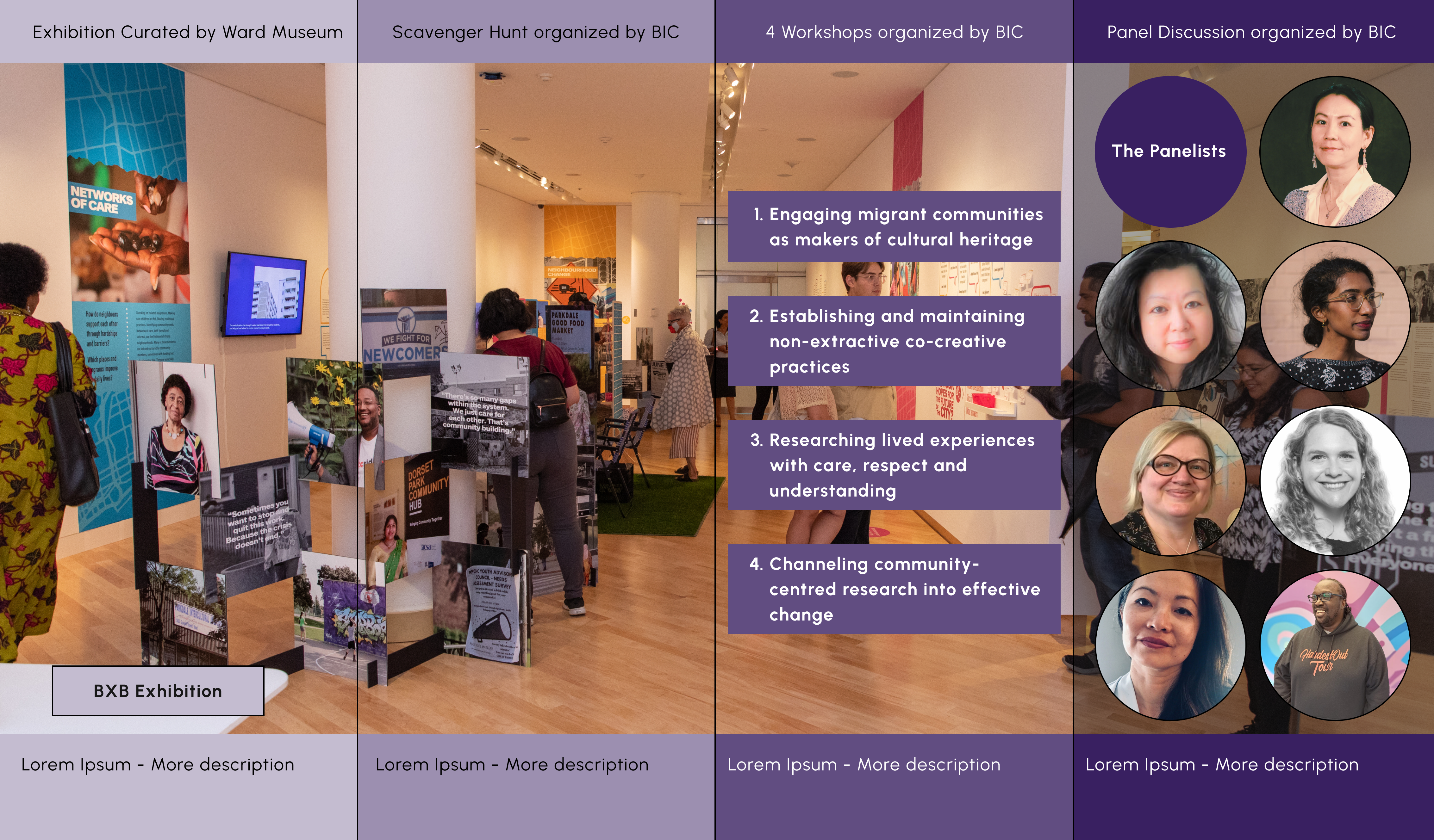
WORKSHOPS
Engaging migrant communities as makers of cultural heritage
Learning Goals:
- Move away from the current focus in planning on sites that need to be preserved towards the meaning, cultural heritage value and current use for people. We need to understand values, personal connections to places- what makes them important to social life, community life. This requires a shift in thinking towards understanding cultural heritage as a dynamic and ongoing practice, rooted in relationships.
- Encourage workshop participants to prioritize relationships, new forms of sharing, deep listening in communities in order to shift definition of cultural heritage (methodological shift)
- Move institutions towards meaningful community consultations so that we get cultural heritage right in redevelopment- we have to understand sense of place more deeply. What non-physical aspects of a place should redevelopment aim to preserve?
- Heritage is not only about commemoration, it is also about preserving ongoing and evolving cultural practices. BxB isn’t only an archive – it’s also a conversation about the future, future use, future placemaking. Heritage is dynamic, flowing, alive.
- Encourage inclusion of marginalized perspectives, voices in heritage planning, including those of migrants
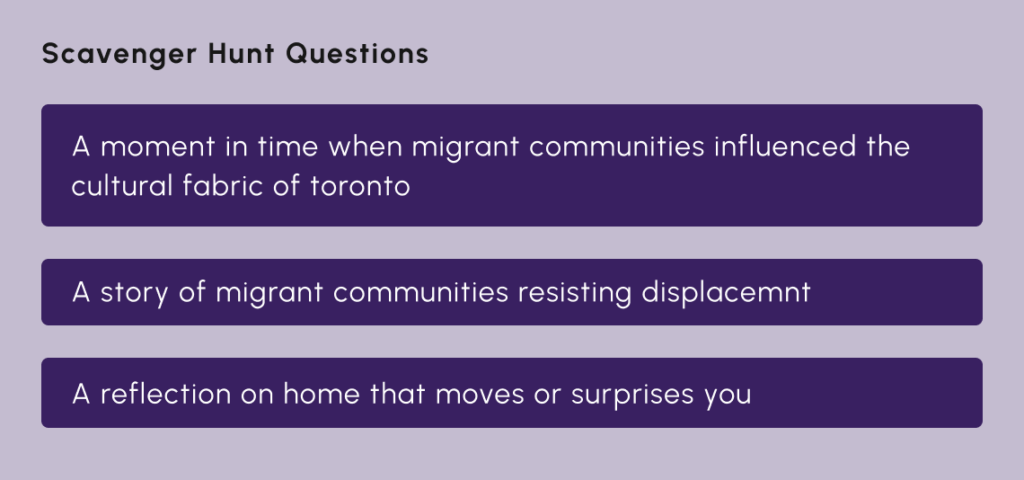
Establishing and maintaining non-extractive co-creative practices
Learning Goals:
- Highlight the BxB process of informed consent, shared authority and ongoing relationships
- Inspire participants to consider their own practices
- Collectively identify barriers to non-extractive co-creative practices in a range of professional settings (e.g. money!! Short windows of time)
- Conversely, identify what resources are available as part of a large organization or institution and how they can be mobilized to conduct non-extractive research (e.g. money as well)
- Consider the impact of a non-extractive co-creative practice on research outcomes
- Highlight importance of compensation, reciprocity (where to start with that- making relationships visible, meeting community goals, training and hiring, creating professional opportunities)
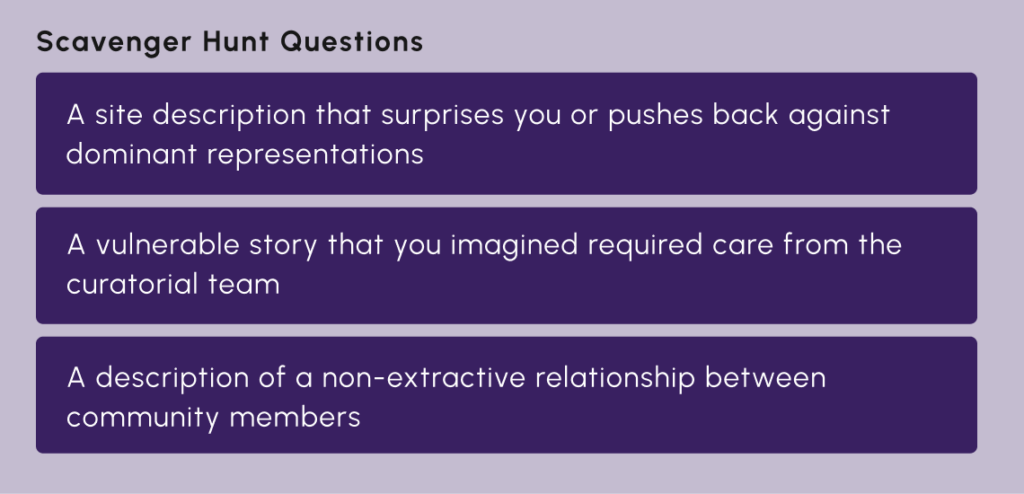
Researching lived experiences with care, respect and understanding
Learning Goals:
- Highlight the BxB process of informed consent, shared authority and ongoing relationships
- Highlight what kind of research outcomes might be possible when you research with care, respect, and understanding (i.e. the beautiful descriptions that we get from our oral histories, because they are told on the the storytellers’ own terms)
- Decentre experiences that you might consider “normal” or “quotidian” in favour or letting people tell you what is normal or quotidian for them
Inspire participants to consider their own practices- Discuss what researching with care might look like in different fields. How does it happen throughout the research process?
- Collectively identify barriers to researching professional settings (e.g. money!! Short windows of time, particular research methods (e.g. surveys)
- Conversely, identify what resources are available as part of a large organization or institution and how they can be mobilized to conduct careful research (e.g. money as well)
- Highlight importance of compensation, reciprocity (where to start with that- making relationships visible, meeting community goals, training and hiring, creating professional opportunities)
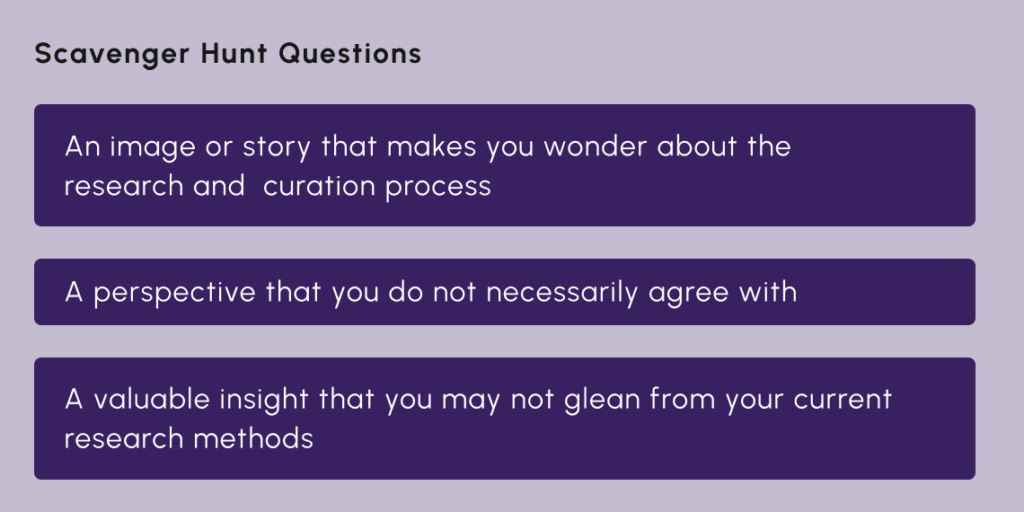
Channeling community-centred research into effective change
Learning Goals:
- Highlight how Block by Block practices — such as emphasizing oral history methodology, and hiring researchers from the community — can result in results that authentically represent storyteller and community experiences
- Discuss where professionals can integrate the results of community centred research (e.g. community benefits frameworks, deputations, focus groups, policy recommendations, changing organizational practices, …?)
- The stories that we’ve collected have material value. How can it benefit work towards a more equitable city?
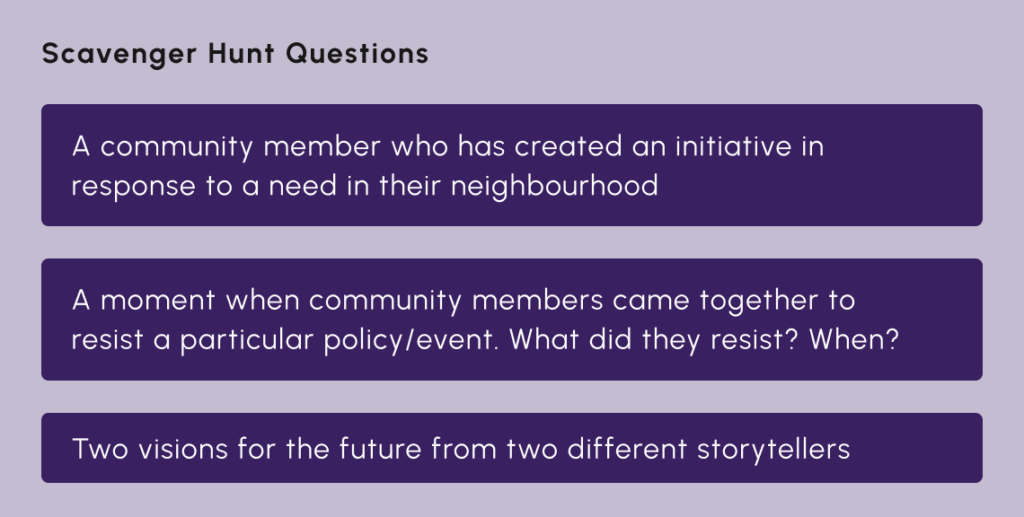
PANEL
Date, location, other logistic details
Lorem ipsum dolor sit amet, consectetur adipiscing elit, sed do eiusmod tempor incididunt ut labore et dolore magna aliqua. Ut enim ad minim veniam, quis nostrud exercitation ullamco laboris nisi ut aliquip ex ea commodo consequat. Duis aute irure dolor in reprehenderit in voluptate velit esse cillum dolore eu fugiat nulla pariatur. Excepteur sint occaecat cupidatat non proident, sunt in culpa qui officia deserunt mollit anim id est laborum.

Tamara Anson-Cartwright
Program Manager, Policy and research, Heritage Planning, Toronto City Planning Division
Tamara Anson Cartwright is a Program Manager, Policy and Research, in Heritage Planning in the Urban Design section of Toronto’s City Planning Division. Tamara and her team advise Toronto Council on numerous heritage policies and legislative amendments, such as the identification and evaluation of heritage properties for inclusion on the City’s Heritage Register and Heritage Conservation District studies. Prior to joining City Planning in 2015, Tamara was a Conservation Advisor in the Ontario Public Service for over 25 years.

Shiralee Hudson Hill
Museum Administrator, City of Toronto
Shiralee Hudson Hill is an award-winning museum planner known for creating engaging and inclusive experiences. She is currently a Museum Administrator with the City of Toronto, leading operations at Fort York National Historic Site. Before this, she spent over a decade advancing interpretive planning at the Art Gallery of Ontario, advised on cultural projects worldwide as a consultant with Lord Cultural Resources, and managed community arts initiatives with Arts Etobicoke.

Angela Koh/XuYingsi
Co-Chair, West End Coalition for Housing Justice
Angela Koh/XuYingsi has worked with various community groups, grassroots organizers, and non-profits overseas and in Canada. She is currently part of the Community Response & Advocacy Unit at West Neighbourhood House, and is engaging in city-wide coalition building around Inclusive Development as the Co-Chair of the West End Coalition for Housing Justice.

Bryan Peart
Golden Mile Coordinator, Working Women Community Centre
Bryan Peart is the Golden Mile Coordinator for Working Women Community Centre operating the Victoria Village Hub. He has been living and working in the Golden Mile for 17 years and is currently in his 4th year of the Creative Industry at the Toronto Metropolitan University. He is the founder of many grassroots groups and initiatives that have led him to achieve the Ontario Medal of Honor for volunteering. As an entrepreneur, Bryan is currently facilitating food handling certification to residents all over Ontario.

Dr. Thy Phu
MCIP, RPP, Associate Professor, School of Urban and Regional Planning, Toronto Metropolitan University
Dr. Thy Phu is a Distinguished Professor of Race, Diaspora and Visual Justice at the University of Toronto, Scarborough. From 2016-2019, she was Director of the Family Camera project, which engaged local communities in the archiving of photographs and their stories. She is currently a Co-Director of Refugee States, a community-led partnership project, funded by the SSHRC Race, Gender, and Diversity Initiative, which is creating a counter-archive of narratives of forced migration.

Dr. Zhixi Zhuang
MCIP, RPP, Associate Professor, School of Urban and Regional Planning, Toronto Metropolitan University
Dr. Zhixi Zhuang is an Associate Professor at the School of Urban and Regional Planning, Toronto Metropolitan University. Founder of the DiverCityLab (www.divercitylab.com), her research explores the growing urban diversity and how city-builders can incorporate equity and inclusion into their practices. Her work focuses on the lived experiences of immigrant and racialized communities, emphasizing their agency for cultural recognition, as well as social, economic, political, and spatial inclusion. Thus, in turn, sheds light on municipal policies and governance.

Brannavy Jeyasundaram
Co-Executive Director, Toronto Ward Museum
Brannavy Jeyasundaram is a writer and museum professional living in Toronto. Brannavy is an interpretive planner at the Royal Ontario Museum and was previously the co-executive director of the Toronto Ward Museum. In 2023, she wrote and curated “We Will Remember This”, a collection of literary essays published by Nova Dance and Dance Collection Danse. Much of her work is motivated by an effort to understand diasporic will and memory.